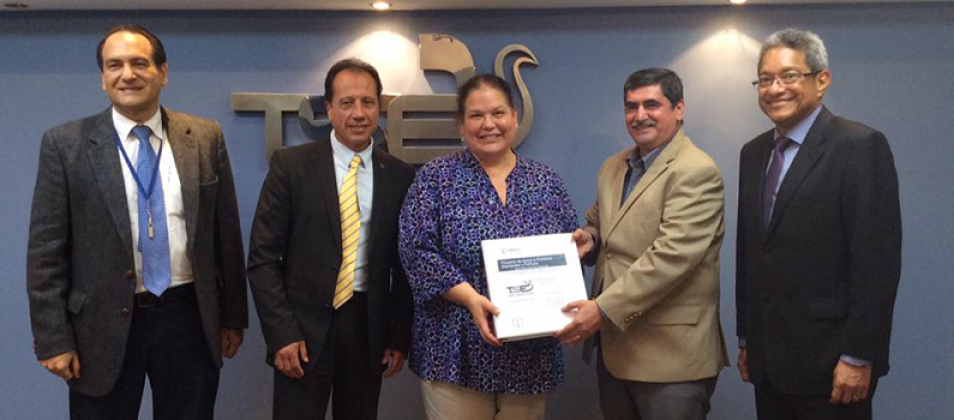
Preliminary Electoral Results Transmission Document Presented to El Salvador’s Supreme Electoral Tribunal
by Marit Björnlund*
On May 31, the International Foundation for Electoral Systems (IFES), represented by Regional Director for the Americas Margarita R. Seminario, delivered its final document on the 2019 transmission of preliminary electoral results (TREP) to the Supreme Electoral Tribunal (TSE) of El Salvador. The document, produced in close cooperation with the TSE’s Information Technology Unit (USI), describes and analyzes all operational and logistical procedures that took place as part of the TREP for El Salvador’s presidential election on February 3, 2019. This election marked the first time that the TSE has systematically documented these procedures.
At the presentation ceremony, the TSE thanked IFES for its work during the 2019 electoral and post-electoral processes and highlighted the importance of the ongoing collaboration with the TSE ahead of the 2021 municipal and legislative elections. Six of the TSE’s 10 magistrates and alternates were present, including Magistrate President Julio Olivo Granadino, along with the TSE’s Head of International Cooperation Jaime Juárez, USI Head Rene Torres and Secretary General Luis Benavides.
The collaborative document is expected to help others understand the TREP processes, document the successes and lessons learned from the 2019 process, and facilitate its implementation in future elections. According to IFES’ expert team and the TSE magistrates, having all this information in one place makes it easier to plan and oversee TREP activities, follow up on each stage of their implementation, train staff and identify opportunities for further improvement.
The final document provides a series of evidence-based recommendations from IFES and the TSE, such as creating a permanent TREP team within the USI and incorporating new technology to enhance the current procedures. Some of the recommendations include writing the TREP implementation and regulation into reforms to the electoral law; continuing to build the capacity of the TSE staff working on TREP, including potentially creating permanent TREP staff instead of temporarily hiring staff for each election; and incorporating TREP specialists as part of the USI, ensuring continuity of learning from each electoral process.
The collaboration between IFES and the TSE will enhance the TSE’s preparation for the next national elections in 2021, as they will soon begin planning the technological aspects, training staff and implementing mechanisms for management and scrutiny of the TREP system, contributing to standardization and certification of the process.
IFES’ work in El Salvador is supported by the “Free, Fair and Transparent Presidential Elections in El Salvador” project, funded by the United States Agency for International Development through the Consortium for Elections and Political Process Strengthening (CEPPS). The project’s technical assistance focuses on supporting the TSE’s efforts to improve its electoral information technology systems, especially for TREP.
Established in 1995, CEPPS pools the expertise of three premier international organizations dedicated to democratic development: IFES, the International Republican Institute and the National Democratic Institute. CEPPS has a 20-year track record of collaboration and leadership in democracy, human rights and governance support, learning from experience, and adopting new approaches and tools based on the ever-evolving technological landscape.
*Marit Björnlund is a program coordinator for the Americas at IFES.










